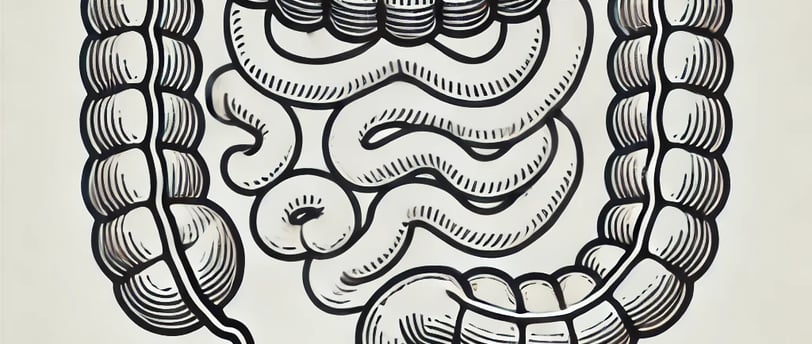Irritable Bowel Syndrome (IBS): Symptoms, Causes, and Treatment
Understand Irritable Bowel Syndrome (IBS)—its symptoms, causes, diagnosis, and treatments to effectively manage this common digestive disorder.
GASTROINTESTINAL
Rishwin A R
11/5/20242 min read


What is IBS?
Irritable Bowel Syndrome (IBS) is a gastrointestinal disorder affecting the large intestine, causing abdominal pain, bloating, and changes in bowel habits. While not life-threatening, it can significantly impact quality of life.
Key Symptoms
IBS symptoms can vary but often include:
Abdominal pain: Often relieved by bowel movements.
Bloating and gas: Feeling of fullness and frequent flatulence.
Diarrhea or constipation: Sometimes alternating.
Changes in stool: Mucus, irregular frequency, and consistency.
Types of IBS
IBS is categorized by bowel habits:
IBS with Constipation (IBS-C): Constipation-predominant.
IBS with Diarrhea (IBS-D): Diarrhea-predominant.
Mixed IBS (IBS-M): Alternating between diarrhea and constipation.
Unsubtyped IBS (IBS-U): Does not fit into specific patterns.
Causes and Risk Factors
While the exact cause of IBS is unknown, contributing factors may include:
Gut-Brain Communication: Abnormal signaling between the gut and brain.
Infections: Gastrointestinal infections or bacterial overgrowth.
Stress and Mental Health: Anxiety and stress can exacerbate IBS.
Diet and Food Sensitivities: Trigger foods like dairy, gluten, and high-FODMAP items.
Hormones: Women often experience worse symptoms around menstruation.
Family history may also increase the likelihood of IBS.
Diagnosis
IBS diagnosis often involves:
Rome IV criteria: Specific symptom-based criteria.
Medical history and physical exam
Stool and blood tests: To rule out other conditions.
Colonoscopy: For severe or unusual cases.
Treatment Options
There is no cure for IBS, but symptoms can be managed with:
Dietary Adjustments:
Low-FODMAP Diet: Reducing fermentable carbs for symptom relief.
Increased Fiber: Especially for IBS-C; soluble fiber is often recommended.
Probiotics: Certain strains may help balance gut bacteria.
Medication:
Antispasmodics: For pain and cramping relief.
Laxatives or Anti-diarrheals: Depending on predominant symptoms.
Antidepressants: Low doses to aid gut-brain interactions
Lifestyle Changes:
Exercise: Regular physical activity supports gut health.
Cognitive Behavioral Therapy (CBT): For stress-related symptoms.
Relaxation Techniques: Yoga and meditation can alleviate stress.
Alternative Therapies:
Acupuncture: May reduce symptom severity.
Peppermint Oil: Known to help with abdominal pain and bloating.
Foods to Avoid
Common IBS trigger foods include:
Dairy products: Especially for those with lactose intolerance.
High-fat foods: Fried items and processed meats.
Carbonated drinks: Can lead to bloating.
High-FODMAP foods: Beans, garlic, onions, certain fruits, and dairy.
Consult a healthcare provider to create a diet plan tailored to your needs.
Managing IBS Symptoms
Living with IBS involves careful management through diet, lifestyle, and stress reduction. Some strategies include
Symptom Diary: Track foods, symptoms, and stress to identify triggers.
Hydration: Drinking water aids digestion and can relieve constipation.
Smaller, Frequent Meals: Reduces bloating and discomfort.
Support Groups: Can provide coping strategies and emotional relief.
When to See a Doctor
Consult a doctor if you experience severe or persistent symptoms, such as unexplained weight loss or blood in your stool, for further evaluation and treatment.
Conclusion
While IBS can be challenging, managing it is possible with the right approach. Understanding personal triggers and making lifestyle adjustments can greatly improve symptoms. Seek guidance from a healthcare provider to develop a tailored treatment plan.
Syndromes.xyz
Explore medical syndromes and their details here.
For Educational purposes only
The information on this site is not in any way, replacement for professional advice. Always consult your physician regarding personal queries
Connect
Support
syndromesxyz@gmail.com
© 2024. All rights reserved.
